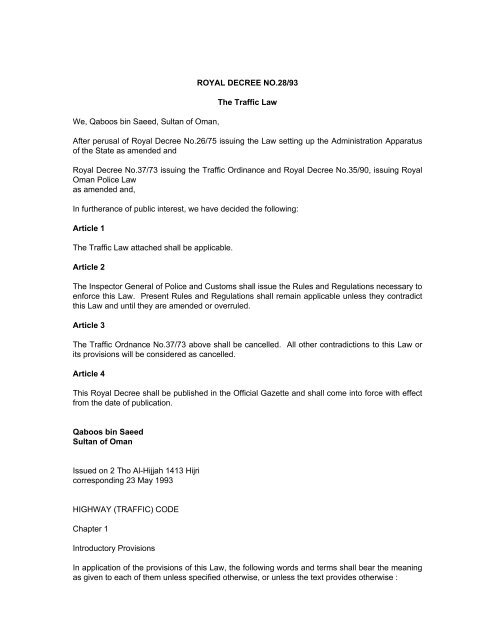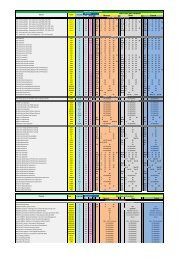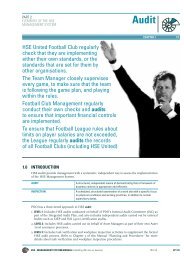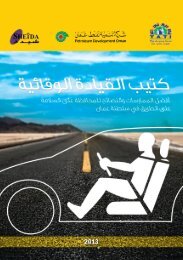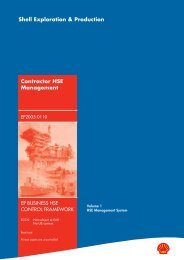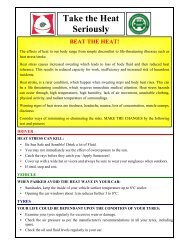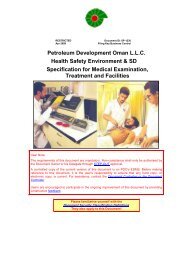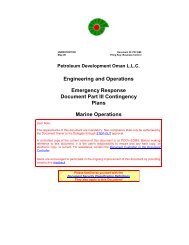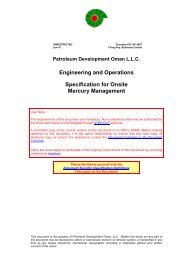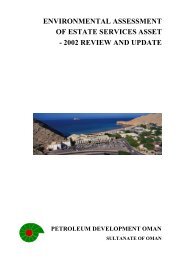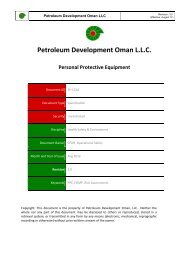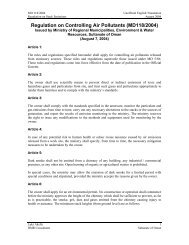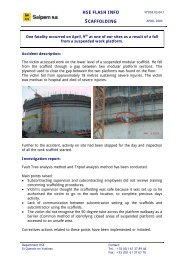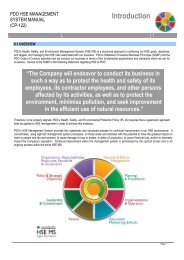ROYAL DECREE NO.28/93 The Traffic Law We, Qaboos bin ... - PDO
ROYAL DECREE NO.28/93 The Traffic Law We, Qaboos bin ... - PDO
ROYAL DECREE NO.28/93 The Traffic Law We, Qaboos bin ... - PDO
You also want an ePaper? Increase the reach of your titles
YUMPU automatically turns print PDFs into web optimized ePapers that Google loves.
<strong>We</strong>, <strong>Qaboos</strong> <strong>bin</strong> Saeed, Sultan of Oman,<br />
<strong>ROYAL</strong> <strong>DECREE</strong> <strong>NO.28</strong>/<strong>93</strong><br />
<strong>The</strong> <strong>Traffic</strong> <strong>Law</strong><br />
After perusal of Royal Decree No.26/75 issuing the <strong>Law</strong> setting up the Administration Apparatus<br />
of the State as amended and<br />
Royal Decree No.37/73 issuing the <strong>Traffic</strong> Ordinance and Royal Decree No.35/90, issuing Royal<br />
Oman Police <strong>Law</strong><br />
as amended and,<br />
In furtherance of public interest, we have decided the following:<br />
Article 1<br />
<strong>The</strong> <strong>Traffic</strong> <strong>Law</strong> attached shall be applicable.<br />
Article 2<br />
<strong>The</strong> Inspector General of Police and Customs shall issue the Rules and Regulations necessary to<br />
enforce this <strong>Law</strong>. Present Rules and Regulations shall remain applicable unless they contradict<br />
this <strong>Law</strong> and until they are amended or overruled.<br />
Article 3<br />
<strong>The</strong> <strong>Traffic</strong> Ordnance No.37/73 above shall be cancelled. All other contradictions to this <strong>Law</strong> or<br />
its provisions will be considered as cancelled.<br />
Article 4<br />
This Royal Decree shall be published in the Official Gazette and shall come into force with effect<br />
from the date of publication.<br />
<strong>Qaboos</strong> <strong>bin</strong> Saeed<br />
Sultan of Oman<br />
Issued on 2 Tho Al-Hijjah 1413 Hijri<br />
corresponding 23 May 19<strong>93</strong><br />
HIGHWAY (TRAFFIC) CODE<br />
Chapter 1<br />
Introductory Provisions<br />
In application of the provisions of this <strong>Law</strong>, the following words and terms shall bear the meaning<br />
as given to each of them unless specified otherwise, or unless the text provides otherwise :
1. Inspector General: Inspector General of Police and Customs.<br />
2. <strong>The</strong> Directorate : <strong>The</strong> Directorate General of <strong>Traffic</strong> or any of its branches in the<br />
Governorates or Regions.<br />
3. Vehicle : Means of transport or pulling, designed to travel on wheels or track,<br />
propelled by mechanical power or otherwise.<br />
4. Motor Vehicle : A vehicle propelled by mechanical power designed to be used on roads.<br />
5. Motorcar : Motor vehicle usually used for the carriage of persons or things or both.<br />
6. Motorcycle : Vehicle fitted with two or more wheels and mechanical engine not<br />
designed in the form of a motorcar used<br />
for the carriage of persons or things. A side car may be attached<br />
to it.<br />
7. Bicycle : A vehicle fitted with two or more wheels without a mechanical engine<br />
propelled by the power of the rider designed for the carriage of person or things. A side car may<br />
be attached to it.<br />
8. Trailer : A vehicle without an engine designed and made to be towed by a motor<br />
vehicle.<br />
9. Locomotive : A vehicle connected or which may be connected to one or more trailers<br />
to form one unit.<br />
10. Private car : A vehicle designed to be used for personal use, carriage of persons and<br />
their personal belongings only.<br />
11. Taxi : A vehicle used for the carriage of passengers for a fee. It may not be<br />
occupied by more than 8 people.<br />
12. Bus : A vehicle used for the carriage of passengers, for a fee where there are<br />
more than eight seats (not including the driver's seat).<br />
13. Public bus (coach): A vehicle used for the carriage of passengers for a certain rate for<br />
each passenger which regularly operates within specific areas.<br />
14. Private bus : A vehicle used for the carriage of certain categories of persons such as<br />
school children, employees and workers for companies or establishments and their families.<br />
15. Commercial vehicles: A vehicle used for the carriage of belongings, goods and animals for<br />
a fee. <strong>The</strong>se vehicles may be equipped with refrigerators.<br />
16. Private Transport A vehicle used for the carriage<br />
Vehicle : of goods, loads and animals which is limited to personal use.<br />
17. Emergency vehicles: A vehicle used for the carriage of emergency and serious cases and<br />
which are assigned for emergency duties (i.e. ambulances, fire engines and police vehicles).<br />
18. Learner Vehicles : A vehicle used to train drivers which is designed for such purpose.
19. Vehicles for special: A vehicle designed and always used for special assignments such as<br />
carriage of dead bodies, cinema and TV use, workshops, criminal laboratories, industrial<br />
construction, agriculture and other such vehicles.<br />
20. Tractor : A motor vehicle, the design of which does not allow the carriage of<br />
persons, belongings or animals. Its use is limited to towing trailers, agricultural and other<br />
equipment.<br />
21. <strong>The</strong> road : Any passage open for public traffic, pedestrians, animals, means of<br />
transport or carriage or towing including roads, streets, squares, passages and bridges which the<br />
public are allowed to use.<br />
22. Pedestrian crossing : A marked place on a roadway or street, where pedestrians may cross<br />
before which drivers must stop to allow pedestrians to cross safely.<br />
23. Parking : Leaving a vehicle in a certain place for a limited/unlimited time.<br />
24. Road signs : Marks, lines or signs fixed on the roads or sides of the roads for the<br />
purpose of control and regulation of traffic. <strong>The</strong> <strong>Traffic</strong> Regulations shall specify such marks and<br />
signs.<br />
25. <strong>The</strong> Passenger : Any person in the vehicle getting out of/into a vehicle apart from the<br />
driver.<br />
26. <strong>The</strong> Driver/Rider : Any person who undertakes the driving of a vehicle, or who rides an<br />
animal used for pulling, loading or riding.<br />
27. Driving licence : <strong>The</strong> official permit issued by the competent national or security authority<br />
which allows the holder to drive certain type/s of vehicles.<br />
28. Motor vehicle: <strong>The</strong> official licence issued by the competent national or security authority<br />
which allows the vehicle to driven on the road during the period of its validity in accordance with<br />
the conditions stipulated in the <strong>Law</strong>.<br />
29. Motor vehicle : <strong>The</strong> official document which Registration card proves the ownership of the<br />
vehicle and is issued by the Directorate.<br />
30. Pedestrians : Persons walking on roads and the like, in accordance with the<br />
Regulations of the <strong>Law</strong>.<br />
CHAPTER 2<br />
Registration and Licensing of Motor Vehicles<br />
Article 2<br />
No motor vehicle is permitted to be driven on the road unless it is registered and a licence has<br />
been obtained with the exception of the following vehicles :<br />
1. Motor vehicles belonging to H.M. the Sultan.<br />
2. Motor vehicles registered with military authorities and which bear military numbers.
3. Motor vehicles belonging to foreign visitors, transients and tourists.<br />
4. Motor vehicles bearing commercial numbers. <strong>The</strong> Regulations shall specify the terms and<br />
conditions to drive the vehicles mentioned in paras 2, 3 & 4 above.<br />
Article 3<br />
No vehicle may be licensed unless the following conditions are complied with :<br />
1. <strong>The</strong> vehicle shall be registered with the "Directorate" and assigned a specific number.<br />
2. <strong>The</strong> vehicle must comply with the safety conditions specified in this <strong>Law</strong>. <strong>The</strong> Regulations<br />
specify the terms and conditions related to licensing of the vehicles of disabled persons.<br />
3. <strong>The</strong> vehicle must be inspected technically at the time and place specified by the competent<br />
department at the "Directorate" to ensure that it fulfills the safety conditions. <strong>The</strong> Regulations of<br />
the <strong>Law</strong> specify the rules and procedures relating to technical inspection and the exemptions<br />
thereto.<br />
4. <strong>The</strong> vehicle must be insured against civil liability resulting from accidents, in favour of third<br />
parties, throughout the duration of the licence in accordance with the provisions of the law<br />
concerned.<br />
5. Registration, technical inspection and licensing fees must be paid for each vehicle. <strong>The</strong><br />
Regulations of the <strong>Law</strong> specify the licensing procedures, licence validity fees, and rules and<br />
regulations relating to renewals.<br />
Article 4<br />
All types of motor vehicles must be registered in special registers with the relevant department at<br />
the Directorate and in accordance with the rules, conditions and forms specified by the<br />
Regulations.<br />
<strong>The</strong> Regulations specify the documents necessary to prove ownership of the vehicle. <strong>The</strong> owner<br />
shall be granted an ownership registration card in accordance with the form designated therefor.<br />
Article 5<br />
<strong>The</strong> owner of the vehicle or his representative must submit an application to renew the licence<br />
using the requisite form and prove that he has paid the renewal fees within thirty (30) days prior<br />
to the expiry of present licence. If the last day of these 30 days was an official holiday then the<br />
application may be submitted on the first working day after such holiday. If the application for<br />
renewal is delayed beyond such a date a fine of 10% of the fee shall be charged. <strong>The</strong> licence<br />
shall be cancelled after 30 days from the date of expiry and the registration licence and number<br />
plates shall be withdrawn if the vehicle in question is seen on the road, without prejudice to the<br />
punishment specified.<br />
Article 6<br />
After payment of the specified fees, and in accordance with an application by the owner of the<br />
motor vehicle or his representative, the vehicle may be transferred and licenced or its number<br />
plates changed by another licensing department within the Sultanate.
Article 7<br />
<strong>The</strong> owner of a motor vehicle who changes his address registered at the Directorate must notify<br />
the Directorate of his or her new address within 10 days of such a change. He must also notify<br />
the Directorate of the loss or damage of the registration licence within 10 days. Accordingly the<br />
owner may, pursuant to his request, and after payment of the fees specified, obtain a<br />
replacement for the damaged or lost licence, in accordance with the conditions and procedures<br />
specified in the Regulations.<br />
Article 8<br />
If the owner of the vehicle is a judicial person, then the licence issued must show the name of a<br />
person chosen by the owner to be his representative who will be responsible for any provisions of<br />
this law provided that such representative agrees to carry this responsibility. If the owner of the<br />
motor vehicle is unqualified for this responsibility then the name of the guardian or next of kin<br />
must be mentioned in the licence to be responsible for any violation of the provisions of this <strong>Law</strong><br />
without prejudice to any responsibility of the unqualified person.<br />
Article 9<br />
If the owner of the motor vehicle is deceased or considered as being lost, then his heirs or their<br />
representatives must notify the Directorate of the same within 60 days from the date of death or<br />
from the date of decision of his loss, and appoint a person to be responsible for the vehicle. If the<br />
motor vehicle is inherited by one of the heirs then he must transfer ownership into his name within<br />
the period specified by the Directorate.<br />
Article 10<br />
If the motor vehicle is sold or if any action is taken to transfer it to a third party, the owner must<br />
accordingly notify such sale or transfer to the Directorate in writing within 7 days from the date of<br />
sale or transfer, specifying the name of the new owner and his address. <strong>The</strong> Regulations of this<br />
<strong>Law</strong> set out the procedures relating to the transfer of ownership licensing and the documentation<br />
required, provided that a copy of the document which proves the transfer of ownership must be<br />
included.<br />
<strong>The</strong> original owner whose the motor vehicle is registered in his name shall remain responsible for<br />
the fees due and the enforcement of the provisions of this law until the motor vehicle is<br />
transferred and licensed in the name of the new owner.<br />
Article 11<br />
Each motor vehicle on the road shall carry two number plates issued by the Directorate upon<br />
completion of registration and licensing formalities. One of the number plates must be fixed on<br />
the front and the other on the rear of the motor vehicle. <strong>The</strong>y may not be used for any other<br />
vehicle, replaced for others nor may their form or particulars be altered. In the event of breach of<br />
these provisions, members of the Royal Oman Police may seize and withdraw the vehicle and its<br />
licence shall be considered cancelled from the date of the seizure.<br />
Any trailer shall have only one number plate fixed to the rear, and shall be subject to the rules<br />
and regulations applicable to number plates.<br />
<strong>The</strong> Regulations of this <strong>Law</strong> specify the conditions relating to the issue of number plates, types,<br />
colours, measurements and fees.
Article 12<br />
Number plates are the property of the State, and the owner of the motor vehicle must return them<br />
to the Directorate when the use of the vehicle is finished or when the licence of the motor vehicle<br />
is cancelled or not renewed or when the motor vehicle is finally exported. <strong>The</strong>refore, the owner of<br />
the vehicle must, in the event of loss or damage of any of the number plates, or both, promptly<br />
notify the Directorate thereof.<br />
Article 13<br />
<strong>The</strong> number plates relating to motor vehicles belonging to diplomatic and consular missions, Gulf,<br />
Arab and international organisations accredited to the Sultanate shall be issued by the<br />
Directorate in accordance with a request by the Ministry of Foreign Affairs. <strong>The</strong> Regulations<br />
specify the procedures of issue and withdrawal.<br />
Article 14<br />
Any change in the purpose of the use of the motor vehicle or replacement of its engine, chassis<br />
or any other substantial part thereof, or change of colour which changes the statements on the<br />
registration licence may not take place without obtaining the prior consent of the Directorate. <strong>The</strong><br />
owner of the motor vehicle must notify the Directorate in writing within one week of the date of the<br />
change or substituition.<br />
<strong>The</strong> Directorate may carry out a technical test on the motorvehicle to ensure that the vehicle has<br />
been inspected in accordance with technical safety standards.<br />
Article 15<br />
In cooperation with the competent authorities, the Inspector General shall specify the type and<br />
numbers of taxis, commercial vehicles of all types, and other vehicles designated for citizens' use<br />
and shall set up conditions and procedures to register, licence and specify their rates.<br />
CHAPTER 3<br />
Safety<br />
Article 16<br />
No motor vehicle licence shall be issued unless such vehicle is designed and made in<br />
accordance with technical and industrial standards and pursuant to approved specifications. All<br />
constituent parts of the motor vehicles must be solid, sound and efficiently fixed.<br />
In all cases the vehicle must be in good working and running order and always fulfill the<br />
conditions of safety as being specified in this law and the rules and regulations thereof, and be in<br />
a manner which does not expose the driver, passengers or road users to danger nor its use or<br />
driving cause any damage to roads or property.<br />
Article 17<br />
Every motor vehicle must have the following parts:<br />
1. A chassis or other constructional means which must be solid and powerful enough to bear the<br />
pressure of the load and weight which the motor vehicle is designed to carry.
2. An engine solidly designed and firmly assembled to be fit for the use of the motor vehicle.<br />
3. A solid steering free from backlash.<br />
4. Brakes comprising at least two independent devices which control the driving of the motor<br />
vehicle as follows:<br />
A. Foot brake operated pneumatically or hydraulically, mechanically or by means of any other<br />
solid device to control all the wheels.<br />
B. Another brake operated mechanically, by hand or foot. It must be entirely independent<br />
from the foot brake and must control at least two wheels.<br />
5. A clear sound horn.<br />
6. Exhaust silencer by means of a pipe.<br />
7. A reflecting mirror through which the driver may see vehicles<br />
and other objects behind him.<br />
8. Windscreen wipers.<br />
9. Speedometer.<br />
10. Direction indicators and brakes lights.<br />
11. Lights sufficient to light the road at night fitted with a device for dimming.<br />
12. <strong>The</strong> following tools and devices:<br />
- Suitable fire extinguisher always in good working condition.<br />
- Spare tyre fit for use.<br />
- Jack and wrench for the tyres.<br />
- Phosphorus reflecting plate of a triangular shape to be used when necessary.<br />
- Two triangular reflecting plates to be fixed on long vehicles or trailers at the rear to reflect<br />
clearly lights in the dark. <strong>The</strong> front windscreen of the vehicle must be of good quality and the<br />
vehicle must be painted with gloss paint.<br />
Article 18<br />
Lights must be fitted on motor vehicles, trailers and animal pulled carriages in accordance with<br />
the rules specified in the Registration.<br />
Article 19<br />
Dark glass of high opacity may not be used in vehicles or animal pulled carriages.
No reflecting lights (flashes) or additional lamps or horn devices or any other accessories may be<br />
fitted on the vehicle. No number plates other than those specified by the Directorate may be<br />
fitted.<br />
Article 20<br />
Members of the Royal Oman Police may stop any vehicle which does not fulfill the requirements<br />
of solidity, safety or other conditions specified in the vehicle licence and shall escort the subject<br />
vehicle to the Directorate or to nearest police station. If the technical inspection proves that the<br />
vehicle falls short of the requirements in relation to solidity and safety then its licence shall be<br />
withdrawn together with the two number plates without prejudice to the punishment specified.<br />
<strong>The</strong> licensing department may permit the use of the vehicle as soon as the breach is remedied.<br />
CHAPTER 4<br />
Driving Licences<br />
Article 21<br />
No motor vehicle is permitted to be driven on the road without obtaining a driving licence from the<br />
Directorate permitting the holder to drive such type of vehicles.<br />
<strong>The</strong> following persons are exempted from this rule :<br />
1. Holders of driving licences issued by the armed forces and the Royal Oman Police to drive<br />
military vehicles only. Such licences shall be issued after a driving test is arranged by the<br />
competent technical authorities in those departments.<br />
2. Foreign visitors and tourists holding valid international or foreign driving licences in<br />
accordance with the terms and conditions stipulated in the Regulation.<br />
Article 22<br />
Classes of Driving Licences<br />
1. Private car driving licence : (Light duty vehicles) permits the holder to drive light vehicles<br />
whose load does not exceed three tons.<br />
2. General driving licences : (Heavy duty vehicles) permits the holder to drive all types of heavy<br />
vehicles whose load exceeds 3 tons.<br />
3. Heavy equipment driving licence : (Plant and machinery) is issued for driving plant and<br />
machinery prescribed in the Regulation.<br />
4. Motorcycle driving licence : this permits the holder to drive all types of motor cycles.<br />
5. Special case driving licence : issued to disabled persons in accordance with the terms and<br />
conditions specified any the Regulations.<br />
<strong>The</strong> Regulations specify the terms and conditions duration, rules, procedures for renewal, fees<br />
and the circumstances and conditions for exemption.
Article 23<br />
Driving licences specified in Article 22 above, may not be issued for persons less than 18 years of<br />
age, provided that the applicant passes the driving test organised by the Directorate.<br />
<strong>The</strong> Regulations specify the test rules and conditions, forms to be used and fees.<br />
Holders of driving licences issued by a foreign competent and recognised authority may be<br />
exempted from the driving test in accordance with the terms and conditions specified in the<br />
Regulations.<br />
Article 24<br />
<strong>The</strong> holder of a driving licence must always carry the driving licence whilst driving and shall<br />
produce it to members of the police when so required.<br />
Article 25<br />
In the event of damage or loss of the driving licence, the licensee must immediately report this to<br />
the Directorate or to the nearest police station. He may apply for a replacement or substitution<br />
after payment of the fees specified. If the lost licence is eventually found, it must be returned to<br />
the issuing department.<br />
Article 26<br />
No person is allowed to learn to drive without obtaining a provisional driving licence from the<br />
Directorate.<br />
<strong>The</strong> Regulations specify the rules of issue of provisional/learning driving licences, conditions<br />
validity/duration and fees thereof.<br />
Article 27<br />
Driving schools may not be established or managed without obtaining the requisite approval from<br />
the Directorate.<br />
<strong>The</strong> Regulations specify the terms and conditions thereof and the conditions to be fulfilled by<br />
learners vehicles. No person is entitled to teach driving without obtaining a licence from the<br />
Directorate.<br />
Article 28<br />
<strong>The</strong> driving instructor (tutor) shall be considered as if he were the driver of the vehicle. He shall<br />
be solely responsible, or jointly with the trainee, for any breach of the provisions of this law,<br />
unless it is proved that he was not at fault or that the learner has refused his instructions and<br />
directions while learning.<br />
Article 29<br />
<strong>The</strong> Inspector General shall regulate the issue of licences required for driving vehicles and<br />
carriages drawn by animals.<br />
Article 30
<strong>The</strong> Inspector General shall issue the decisions necessary to regulate the licensing in relation to<br />
the establishment and management of motor vehicle clubs which grant international driving<br />
licences, conditions, procedures and fees to issue such licences.<br />
Article 31<br />
On change of address, the licensee must notify the Directorate within 10 days of the date of such<br />
change.<br />
CHAPTER 5<br />
Rules and Ethics of Driving<br />
Article 32<br />
<strong>The</strong> Regulations specify the rules, ethics, traffic signs and marks, and maximum and minimum<br />
speed limits. Drivers must observe such instructions and follow the directives of the members of<br />
police in this respect.<br />
Article 33<br />
Vehicles, animals or belongings may not be left on the road in a manner which may expose life or<br />
property of third parties at risk or danger or hinder traffic.<br />
Article 34<br />
<strong>The</strong> competent department of the Directorate shall set up the rules and regulations necessary to<br />
regulate traffic and ensure the safety thereof and the safety of passengers, pedestrians and<br />
vehicles and supervise the enforcement of such rules.<br />
It will also regulate and specify the placement of the traffic signs, marks and lights and<br />
international traffic signs and other matters to ensure the flow and safety of traffic.<br />
<strong>The</strong> said department shall also regulate and specify parking places for all vehicles including taxis<br />
and public transport and the location of pedestrian crossings.<br />
Article 35<br />
Driving of any vehicle on the road recklessly or at speed or under the influence of alcohol or<br />
tranquilizers or otherwise in a manner which creates danger to the public, their lives or property is<br />
prohibited.<br />
<strong>The</strong> driving licence shall be withdrawn in the event of breach of the provisions of the paragraph<br />
above, without prejudice to the punishment specified.<br />
Article 36<br />
<strong>The</strong> Inspector General may specify where parking is restricted for a limited time and the fees<br />
therefore. A decision shall be issued to regulate parking in such places and procedures in<br />
relation to the collection of such fees.<br />
Article 37
Roads may not be occupied converted or works carried out, on the road or object left on the road<br />
in a manner which causes the delay of traffic without a special licence from the Directorate in<br />
coordination with the competent authorities. Royal Oman shall take the necessary preventative<br />
measures in this respect. <strong>The</strong> Regulation specify the guidelines to be used. <strong>The</strong> police shall duly<br />
remove such objects.<br />
Article 38<br />
<strong>The</strong> driver of a vehicle, if involved in a traffic accident which causes personal injury or damage to<br />
the public or personal property, must stop and immediately report the accident to the nearest<br />
police station or ambulance authority.<br />
Article 39<br />
<strong>The</strong> owner of the motor vehicle, the licencee, the holder of the vehicle or the person responsible<br />
for it, shall be fully responsible for any breach of the provisions of this law or the Regulations<br />
thereof, unless he proves that he was not the driver of the vehicle when the breach took place,<br />
provided that he is able to provide sufficient information about the person who was driving the<br />
vehicle.<br />
Article 40<br />
It is prohibited to carry out car races or cycle races or any demonstration for the purpose of<br />
publicity or advertisement or organising of processions or otherwise organise functions which<br />
lead to traffic jams or traffic delay, without obtaining a licence to do so from the Directorate.<br />
CHAPTER 6<br />
General and Final Provisions<br />
Article 41<br />
<strong>The</strong> owner of the motor vehicle shall not allow any person who does not hold a licence qualifying<br />
him to drive such type of vehicles, to drive his vehicle.<br />
Article 42<br />
Members of the police force shall have the right to ask the owner of the motor vehicle to give<br />
them the name and address of the person who was driving his vehicle at the time of any breach,<br />
failing which, or if he gives false information, he shall be punished by the same punishment as<br />
decided in accordance with this law as the driver who breaches the <strong>Law</strong>, without prejudice to any<br />
other punishment decided by <strong>Law</strong>.<br />
Article 43<br />
No writing, drawings or other marks may be allowed on the body or part of the vehicle, other than<br />
those required by the <strong>Law</strong> and Regulations thereof, without the approval of the Directorate.<br />
Vehicles may not be used for publicity by fitting loud speakers, signboards, floats or other means<br />
of publicity without the approval to do so from the Directorate. Members of the police may seize<br />
the vehicle until the reasons for such breach are removed, without prejudice to the punishment<br />
decided.
<strong>The</strong> Directorate may, however, allow the owner to write his name address, trademark and<br />
activities on the vehicle provided that such marks do not affect the particulars which are required<br />
to be prominently recorded on the vehicle.<br />
Article 44<br />
<strong>The</strong> Directorate undertakes to moniter the regularity of traffic and enforcement of the provisions of<br />
this <strong>Law</strong> and the Regulations thereof. Members of the police shall undertake to spot any<br />
violations to such provisions. <strong>The</strong> minutes decided in this respect shall be considered as proof to<br />
the facts until otherwise evidenced.<br />
Article 45<br />
<strong>The</strong> Inspector General shall specify the rules and regulations in relation to seizure of vehicles of<br />
all types in violation of the provisions of this law and the manner in which they are seized and the<br />
fees and costs of seizure, in addition to the conditions of selling them in the event that the owners<br />
have failed to report to the Directorate, or have failed to collect them or settle the amounts and<br />
charges due from them. He shall also specify the period required to carry out the sale<br />
procedures after the publication of the announcements required by <strong>Law</strong> regarding this matter.<br />
Article 46<br />
<strong>The</strong> Inspector General shall issue the rules and regulations required to develop and regulate<br />
traffic, particularly in relation to the following:<br />
1. Amounts of fees to register the ownership of vehicles, licence fees, driving licence fees and<br />
their renewal, of any types of licence, and other fees to be collected in accordance with the<br />
provisions of this <strong>Law</strong> and in conjunction with the Ministry of Finance and Economy. In all cases,<br />
the maximum ceiling of any fee may not exceed double the fee imposed prior to the issue of this<br />
<strong>Law</strong>.<br />
2. Specification of the form and type of number plates for motor vehicles and ownership<br />
registration cards and vehicle licences and driving licences.<br />
3. Specification of rules which pedestrians must follow.<br />
4. Specification of the form of international traffic signs and regulation of their placement on<br />
roads and other related matters.<br />
5. Specification of road signs, lights and marks on the roads relating to division of lanes and<br />
regulation of traffic.<br />
6. Rules and regulations relating to the establishment, management and supervision of the<br />
operation of driving schools.<br />
7. Rules and regulations relating to traffic guidance and teaching programmes for the public and<br />
particularily for children and school children.<br />
8. Other rules and regulations which the <strong>Law</strong> stipulates shall be issued by the Inspector<br />
General.<br />
Article 47
<strong>The</strong> Inspector General shall issue a decision in relation to the conditions and statements required<br />
for the documents, applications, licences, permits, issues and records stipulated by law. He shall<br />
also issue the regulations relating to their submission or obtaining them and their filing.<br />
Article 48<br />
Vehicles' ownership registration cards, registration licences and driving licences issued prior to<br />
the enforcement of this <strong>Law</strong> shall remain valid until their expiry dates provided that the provisions<br />
of this <strong>Law</strong> must be observed on renewal thereof.<br />
Chapter 7<br />
Measures and Punishments<br />
Article 49<br />
This provision is without prejudice to the measures stipulated in this <strong>Law</strong> or in any other firm<br />
punishment stipulated in any other law. Any person committing any of the following shall be<br />
punished by imprisonment for a period not exceeding 3 months and by a penalty not exceeding<br />
R.O.3,000/- or both :<br />
1. Breach of provision of Articles 2, 3, 5 (last para), 11, 14, 21, 26 and 27) of this <strong>Law</strong>.<br />
2. Any person who submits to the authorities concerned any incorrect information or who<br />
presents false documents or purposely attempts to prove incorrect statements in the forms and<br />
applications mentioned in this <strong>Law</strong> and the rules and regulations implementing it.<br />
3. Driving of motor vehicles with faulty foot brakes, and/or handbrakes of any type.<br />
4. Driving of a motor vehicle with invalid third party insurance.<br />
5. Purposely attempting to delay the traffic.<br />
6. Carrying out or organising a car race without obtaining a licence.<br />
Article 50<br />
Without prejudice to the measures stipulated in this <strong>Law</strong> or to any harder punishment stipulated in<br />
any other law, any person who commits any of the following actions shall be punished by<br />
imprisonment for a period not exceeding one year and/or by a penalty not exceeding R.O.500/- :<br />
1. Driving a motor vehicle on the road recklessly or at speed or under the influence of alcohol or<br />
tranquilizers or any other materials which affect the brain or otherwise in a manner which<br />
presents a danger to the public, their lives or property. Such punishment shall be doubled if the<br />
rules and rules of traffic were breached during driving under the influence of alcohol, drugs, or<br />
other materials that may affect the brain.<br />
2. To commit or allow an action which violates local traditions and behaviour.<br />
3. To use the motor vehicle for purposes other than those specified in the registration licence.<br />
4. To drive a motor vehicle whose licence or number plates were withdrawn or whose licence was<br />
cancelled or driving licence of the owner was withdrawn or cancelled.
Article 51<br />
Without prejudice to the measures stipulated in this <strong>Law</strong> or to any firm punishment stipulated in<br />
any other law: any person who commits any of the following shall be punished by imprisonment<br />
for a period not exceeding 30 days and/or by a penalty not exceeding<br />
R.O.150/-:<br />
1. Breach of the provisions of Articles 16 (Para 2), 17, 18 and 19 of this law.<br />
2. Breach of the rules and ethics of traffic.<br />
Article 52<br />
Without prejudice to the measures stipulated in this <strong>Law</strong>, any person who breaches any of the<br />
provisions stipulated in this <strong>Law</strong> or the rules and regulations thereof, shall be punished by a<br />
penalty not exceeding R.O.100/- unless otherwise specified by this law.<br />
Article 53<br />
<strong>The</strong> punishments stipulated in Articles 49, 50 and 51 above whether such punishment was<br />
maximum or minimum, shall be doubled when the breach is repeated during the six months<br />
following the said offence.<br />
Article 54<br />
Upon the conviction of an accused for one of the offences stipulated in this <strong>Law</strong>, a Court shall<br />
have the right to order the withdrawal of the driving licence, the registration licence and the<br />
number plates r any of them for a period not exceeding one year, and, in the event of repetition<br />
may extend the duration of withdrawal for a period not exceeding two years.<br />
Article 55<br />
<strong>The</strong> Inspector General or his deputy may not proceed in actions relating to offences where<br />
Articles 49, 50 51 and 52 have stipulated the punishment, if the person who breaches the law,<br />
had paid a penalty to be specified in accordance with the categories and rules issued by the<br />
Inspector General, provided that the value of the penalty may not, in each individual case, exceed<br />
one half of the maximum penalty specified for the subject offence.<br />
<strong>The</strong> settlement amount shall be paid to the treasury of Royal Oman Police or to any of the officers<br />
authorised by the Inspector General to collect such penalties. In all cases of settlements, the<br />
driving licence, registration licence and number plates or any of them may be withdrawn for a<br />
period not exceeding three months.<br />
Article 56<br />
Settlement may not take place if the driver is convicted of murder or has caused an unintentional<br />
injury to third party while driving or if the affected person asks for a compensation which the<br />
accused has refused to pay. In these cases the driving licence, registration licence and number<br />
plates or any of the above may be withdrawn until the penal case is settled.<br />
4.7.<strong>93</strong>


